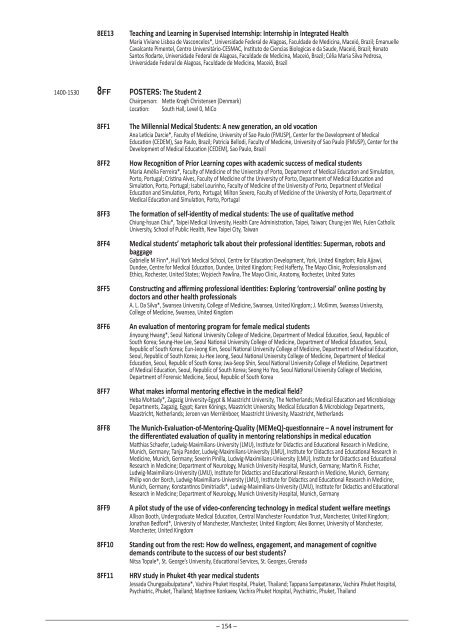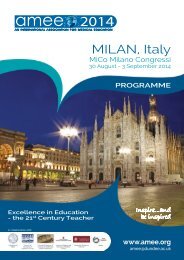Ac1xd
Ac1xd
Ac1xd
Create successful ePaper yourself
Turn your PDF publications into a flip-book with our unique Google optimized e-Paper software.
8EE13Teaching and Learning in Supervised Internship: Internship in Integrated HealthMaria Viviane Lisboa de Vasconcelos*, Universidade Federal de Alagoas, Faculdade de Medicina, Maceió, Brazil; EmanuelleCavalcante Pimentel, Centro Universitário-CESMAC, Instituto de Ciencias Biologicas e da Saude, Maceió, Brazil; RenatoSantos Rodarte, Universidade Federal de Alagoas, Faculdade de Medicina, Maceió, Brazil; Célia Maria Silva Pedrosa,Universidade Federal de Alagoas, Faculdade de Medicina, Maceió, Brazil1400-1530 8FF POSTERS: The Student 2Chairperson: Mette Krogh Christensen (Denmark)Location: South Hall, Level 0, MiCo8FF18FF28FF38FF48FF58FF68FF78FF88FF98FF108FF11The Millennial Medical Students: A new generation, an old vocationAna Leticia Darcie*, Faculty of Medicine, University of Sao Paulo (FMUSP), Center for the Development of MedicalEducation (CEDEM), Sao Paulo, Brazil; Patricia Bellodi, Faculty of Medicine, University of Sao Paulo (FMUSP), Center for theDevelopment of Medical Education (CEDEM), Sao Paulo, BrazilHow Recognition of Prior Learning copes with academic success of medical studentsMaria Amélia Ferreira*, Faculty of Medicine of the University of Porto, Department of Medical Education and Simulation,Porto, Portugal; Cristina Alves, Faculty of Medicine of the University of Porto, Department of Medical Education andSimulation, Porto, Portugal; Isabel Lourinho, Faculty of Medicine of the University of Porto, Department of MedicalEducation and Simulation, Porto, Portugal; Milton Severo, Faculty of Medicine of the University of Porto, Department ofMedical Education and Simulation, Porto, PortugalThe formation of self-identity of medical students: The use of qualitative methodChiung-hsuan Chiu*, Taipei Medical University, Health Care Administration, Taipei, Taiwan; Chung-jen Wei, FuJen CatholicUniversity, School of Public Health, New Taipei City, TaiwanMedical students’ metaphoric talk about their professional identities: Superman, robots andbaggageGabrielle M Finn*, Hull York Medical School, Centre for Education Development, York, United Kingdom; Rola Ajjawi,Dundee, Centre for Medical Education, Dundee, United Kingdom; Fred Hafferty, The Mayo Clinic, Professionalism andEthics, Rochester, United States; Wojciech Pawlina, The Mayo Clinic, Anatomy, Rochester, United StatesConstructing and affirming professional identities: Exploring ‘controversial’ online posting bydoctors and other health professionalsA. L. Da Silva*, Swansea University, College of Medicine, Swansea, United Kingdom; J. McKimm, Swansea University,College of Medicine, Swansea, United KingdomAn evaluation of mentoring program for female medical studentsJinyoung Hwang*, Seoul National University College of Medicine, Department of Medical Education, Seoul, Republic ofSouth Korea; Seung-Hee Lee, Seoul National University College of Medicine, Department of Medical Education, Seoul,Republic of South Korea; Eun-Jeong Kim, Seoul National University College of Medicine, Department of Medical Education,Seoul, Republic of South Korea; Ju-Hee Jeong, Seoul National University College of Medicine, Department of MedicalEducation, Seoul, Republic of South Korea; Jwa-Seop Shin, Seoul National University College of Medicine, Departmentof Medical Education, Seoul, Republic of South Korea; Seong Ho Yoo, Seoul National University College of Medicine,Department of Forensic Medicine, Seoul, Republic of South KoreaWhat makes informal mentoring effective in the medical field?Heba Mohtady*, Zagazig University-Egypt & Maastricht University, The Netherlands; Medical Education and MicrobiologyDepartments, Zagazig, Egypt; Karen Könings, Maastricht University, Medical Education & Microbiology Departments,Maastricht, Netherlands; Jeroen van Merriënboer, Maastricht University, Maastricht, NetherlandsThe Munich-Evaluation-of-Mentoring-Quality (MEMeQ)-questionnaire – A novel instrument forthe differentiated evaluation of quality in mentoring relationships in medical educationMatthias Schaefer, Ludwig-Maximilians-University (LMU), Institute for Didactics and Educational Research in Medicine,Munich, Germany; Tanja Pander, Ludwig-Maximilians-University (LMU), Institute for Didactics and Educational Research inMedicine, Munich, Germany; Severin Pinilla, Ludwig-Maximilians-University (LMU), Institute for Didactics and EducationalResearch in Medicine; Department of Neurology, Munich University Hospital, Munich, Germany; Martin R. Fischer,Ludwig-Maximilians-University (LMU), Institute for Didactics and Educational Research in Medicine, Munich, Germany;Philip von der Borch, Ludwig-Maximilians-University (LMU), Institute for Didactics and Educational Research in Medicine,Munich, Germany; Konstantinos Dimitriadis*, Ludwig-Maximilians-University (LMU), Institute for Didactics and EducationalResearch in Medicine; Department of Neurology, Munich University Hospital, Munich, GermanyA pilot study of the use of video-conferencing technology in medical student welfare meetingsAllison Booth, Undergraduate Medical Education, Central Manchester Foundation Trust, Manchester, United Kingdom;Jonathan Bedford*, University of Manchester, Manchester, United Kingdom; Alex Bonner, University of Manchester,Manchester, United KingdomStanding out from the rest: How do wellness, engagement, and management of cognitivedemands contribute to the success of our best students?Nitsa Topale*, St. George’s University, Educational Services, St. Georges, GrenadaHRV study in Phuket 4th year medical studentsJessada Chungpaibulpatana*, Vachira Phuket Hospital, Phuket, Thailand; Tappana Sumpatanarax, Vachira Phuket Hospital,Psychiatric, Phuket, Thailand; Maytinee Konkaew, Vachira Phuket Hospital, Psychiatric, Phuket, Thailand– 154 –



